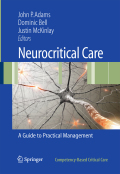
Neurocritical care: a guide to practical management
Adams, John P.
Bell, Dominic
McKinlay, Justin
Traumatic brain injury is the leading cause of death in young people in the UK and USA. The vast majority of these patients will be initially managed outside the teaching hospital environment and many will remain there for the duration of their treatment. As clinicians, what happens during the first hours and days after injury can have a huge influence on the patient’s chance of survival and also their quality of life after the injury. Results of a recent national survey have highlighted 2 main areas of major concern. Firstly, there are far too few specialist neurosurgical beds in out tertiary referral centers, which means that District General Hospital Intensive Care Units are frequently having to manage very seriously brain injured patients. Secondly, many cliniciansdo not know when they should be speaking to their Regional Neurosurgical Centre, do not fully understand how they should be managing these patients, do notknow how to interpret the relevant physiological and radiological data, and have difficulty identifying when to escalate treatment and when the situation has become futile. Lives could therefore be saved and outcomes improved with the introduction of common treatment pathways and better defined lines of communication between referring hospitals and specialist centers. INDICE: Brain Injury and Dysfunction: The Critical Role of Primary Management.- Monitoring the Injured Brain.- The Secondary Management of Traumatic Brain Injury.- Critical Care Management of Subarachnoid Hemorrhage.- Central Nervous System Infections.- Cervical Spine Injuries.- Recent Advances in the Management of Acute Ischemic Stroke.- Seizures on the Adult Intensive Care Unit.- Non-Neurological Complications of Brain Injury.- Acute Weaknesses in Intensive Care.- Coma, Confusion and Agitation in Intensive Care.- Death and Donation inCritical Care: The Diagnosis of Brainstem Death.- Death and Donation in Critical Care: Management of Deceased Organ Donation.- Imaging the Brain Injured Patient.- Ethical Dilemmas within Intensive Care.- Appendices.
- ISBN: 978-1-84882-069-2
- Editorial: Springer
- Encuadernacion: Rústica
- Páginas: 128
- Fecha Publicación: 01/11/2009
- Nº Volúmenes: 1
- Idioma: Inglés
